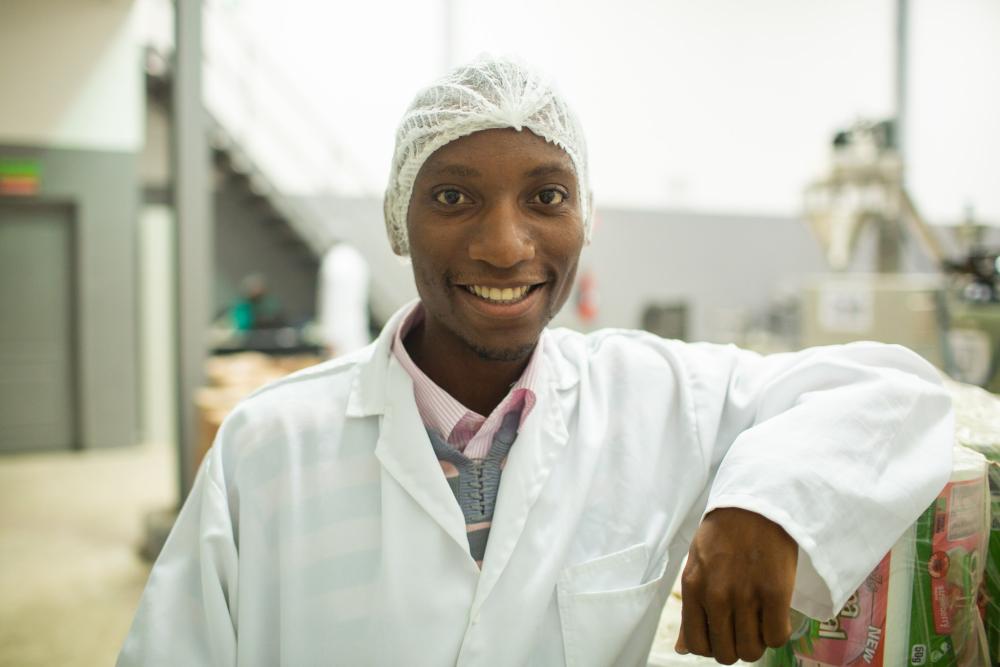
Q+A with DSM Account Manager David Montgomery
David Montgomery joined DSM in January 2021 as an Account Manager in Fresh Dairy for North America. In his role, David supports sales through commercial planning, training, and customer trials.
What was your main motivation for volunteering with Partners in Food Solutions?
I came to DSM, in part, because of the partnership with Partners in Food Solutions (PFS). I am passionate about creating sustainable food systems, and I believe I could have the most impact by volunteering with an organization with these values.
Are there any specific skills you’ve improved or developed while volunteering with Partners in Food Solutions?
The biggest skill I’ve been honing is active listening. The pace of the PFS projects and the needs of the clients are really unique compared to my work with customers in the USA. It’s been a meaningful experience to learn how to listen deeply and intently, and challenge my assumptions. I’ve even been able to transfer these newly honed skills to my day job.
What is your favorite part of volunteering with Partners in Food Solutions? My favorite part of volunteering with Partners in Food Solutions is working with people from all over the world, including both the client companies and other PFS volunteers. Everyone brings their own skills and diverse perspectives to the table and it’s rewarding to collaborate with them all to solve global food challenges.

Virtual Workshop Addresses Food Safety Challenges and Solutions
In 2016, PFS simultaneously noticed two things in Africa: a need to increase capacity in addressing technical challenges at client companies and recent college graduates’ need for professional work experience. This observation led to the development of the PFS Apprenticeship Program. In 2016, PFS started with two apprentices in Ghana and has since grown to over 100 apprentices across seven African countries. Last June, PFS hosted its first Food Safety and Quality Apprentice Workshop with the goal of training past and present apprentices on safety standards in the food industry. Part of the workshop included a professional panel of food safety experts, including Weronika Strzyzowska, a quality specialist at DSM. “The workshop afforded me the opportunity to learn directly from a seasoned professional,” said an apprentice who attended the workshop. “[The volunteer panelists] provided guidance on how to identify activities/tasks that should be performed to achieve optimal food safety.”
PFS Human Capital Services Lead Yvonne Hormenoo said, “The panel of volunteer experts was very valuable.” She added that the panelists spoke to performance measurements, operations and management reviews, standard operating procedures, problem-solving techniques, and more. “Many of the attendees said the panel discussion was the highlight of the four-day workshop!”

Management Trainees Help Bring PFS Alumni Apprenticeship Program to Life
In an effort to address technical challenges at food processing companies in Africa, PFS developed an apprentice program that could help improve food security and give recent graduates professional work experience. Over the years, this program has grown to over 100 apprentices across seven African countries. To further promote. networking and resource sharing between apprentices, PFS needed advice on how to design an effective alumni network. With the help of six management trainees from Bühler, PFS was able to develop the program in 2021 and give recently graduated apprentices an opportunity to stay connected. The volunteers provided key insights into successful alumni programs and shared suggestions on engagement strategies such as communication platforms, content, and more.

Mentorship that Matters
Even at the highest level, mentorship matters. From apprentices to CEOs, mentoring can make a huge difference in an individual, and company’s, trajectory. Over the past year, Bühler President and CEO of North America Andy Sharpe has been mentoring PFS client Managing Director Miraj Shah. Miraj runs Crofts Limited in Kenya, one of the largest avocado oil producers in Africa. “The mentorship has been great,” said Andy. “We’ve had plenty of great discussions from culture to business growth.” The PFS Mentorship Program is a great opportunity to connect with food industry leaders one on one and support African entrepreneurs. To date, the PFS Mentorship Program has connected over 150 individuals and supported both mentors and mentees in reaching their personal and professional goals.

Got Cheese?
Established in 2003, Shambani Milk is a dairy processing company located in Morogoro, Tanzania. Shambani aggregates milk from roughly 250 smallholder dairy farmers and produces several products, including fresh pasteurized milk, sour milk, and flavored yogurt. The company has partnered with Partners in Food Solutions (PFS), international development nonprofit TechnoServe and USAID for more than three years, working on a range of projects from marketing strategy review to HACCP program implementation, ISO certification, and new product development. To further diversify their product portfolio, Shambani Milk reached out to PFS and its network of expert volunteers for guidance on developing a new product – mozzarella cheese.
“Adding mozzarella to our product line is important to our business for several reasons,” said Shambani Co owner and Director of R&D Florent Nguma. “Cheese is one of the highest value dairy products with a good profit margin and that is what our company wants to focus on,” he said. We’ve also seen an increase in demand for cheese at hotels and restaurants due to the growth in local tourism.” To support Shambani Milk with this new endeavor, PFS assembled a team of product development experts including cheese expert Gert van den Hoven from DSM.
Growing up on a milk farm and spending several decades working with cheese in various capacities, Gert was the perfect fit to support Shambani Milk on this project. “In my role at DSM, I help cheese factories create the optimal recipes for their cheese brands, optimize the cheese process, and ensure it is sustainable and cost effective,” he said. “I found it easy and enjoyable to contribute my experience and guide Shambani forward in their mozzarella cheese journey. For me it was a small effort, but for them it made a world of difference.”
Most of Gert’s previous cheese experience involved working with European cheese companies. This project with Shambani was his first cheese development project in Tanzania. The biggest difference for Gert was the scale and equipment available. “The differences in infrastructure required parts of the mozzarella cheese making process to be manual at Shambani,” he said. “This required a different approach and more practical solutions.” Gert also had to work with a more variable milk source than he’s used to. “The varying milk quality proved to be somewhat challenging, but everyone on the team was eager to learn and was motivated to address quality gaps and improve production quality. This made the project super fun and gave me motivation to keep supporting the client.”
Over the past year, the team has conducted several tests including taste, smell, texture, appearance, pH, and shelf life. “We’re very grateful for Gert’s support on this project,” said Florent. “We’ve learned so much from his vast experience and have been implementing his suggestions throughout the project.” Shambani and the team are still working on perfecting the recipe and are excited to share this product with the community in the near future.